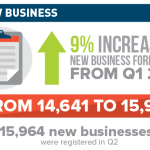New legislation that affects employment rights and responsibilities is introduced every April. This year, the new national living wage legislation has grabbed the attention of many. However, this is not the only change being brought in. Are you aware of the other changes to employment law?
Introduction of the national living wage
For those workers who are 25 or over they will have the right to a national living wage rate of £7.20 per hour from 1st April 2016. This wage is the new top rate of the national minimum wages. It is important for employers to check that the pay of their employees’ is not brought below the new rate as a result of arrangements around
Non-payment of national minimum wage-penalty increase
For all employers who are found to be paying their employees less than the minimum wage will be hit by a fine that will double from the 1st April 2016. The same fine stands for non-payment of the national living wage.
New state pension scheme
From the 6th April 2016 a new single-tier state pension comes into effect. This replaces the old basic state pension as well as the additional state pension. Pension schemes provided by the employer will be unable to contract out of the state pensions and this also means no more national insurance rebates.
For any employer that previously provided a contracted out scheme, the employer and employee national insurance contribution will rise. This means that employees will notice a change in their pay each month so employers should make them aware of this.
No more Employer NICs for apprentices under 25
The Government want to encourage employers to create more apprenticeship opportunities for the younger generation. This is coming into effect from 6 April 2016 and will mean that employers will no longer have to pay National Insurance Contributions for those younger than 25.
Exit payments may have to be repaid by public sector employees
From April 2016, new regulations will come into effect that will require high earning public sector employees to repay any exit payments should they re-join the public sector.
This will include redundancy payments, voluntary exit payment as well as those payments related to early retirement.
Penalties for non-payment of tribunal awards
New legislation will be introduced that gives tribunal enforcement officers the right to impose a financial penalty. This will affect employers that fail to pay a tribunal award or ACAS settlement sum.
It was found that less than half of those who had been awarded compensation had received the full payment from the employer. The penalty will include paying 50% of the unpaid award. This will be related to minimum and maximum amounts and a lower amount if it is paid quickly.
Tier 2 workers will be given a new salary requirement
Skilled foreign workers can be sponsored by employers if they come to the UK to work. They will work under tier two which makes up part of the immigration points system. A new minimum salary of £35,000 will be applicable from 6 April 2016.
Sick pay and statutory family-related pay are held
This is not necessarily a change but there will be no increase in statutory adoption, paternity or shared parental pay rate unlike previous years.
There will also be no change to statutory sick pay which stays on the same rate as 2015.
Peter is a content marketer for London based employment law solicitors Fletcher Day.
Peter Scully
Latest posts by Peter Scully (see all)
- The Importance of Psychology in Packaging - October 1, 2020
- How vape and e-cigarette branding and packaging has evolved around the world - December 4, 2019
- How offline and online marketing can worth together to increase brand awareness - June 23, 2019















